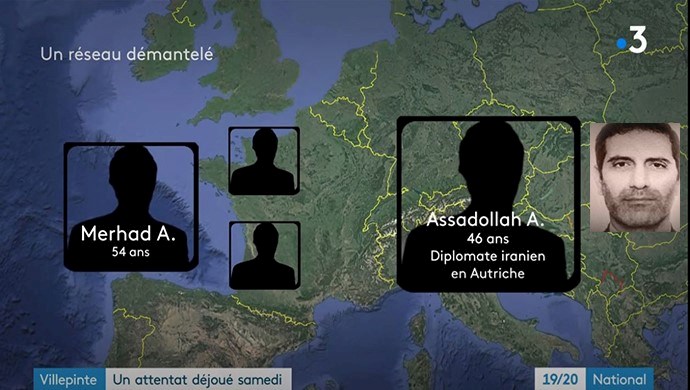Reporting by PMOI/MEK
Iran, July 31, 2020—The second court hearing of the trial of the Iranian regime’s diplomat-terrorist Assadollah Assadi, the main orchestrator of the foiled bombing plot targeting the Free Iran gathering of 2018 of the Iranian Resistance, was held on Thursday, July 30 in Antwerp, Belgium. This is the first time an Iranian diplomat in Europe is on trial and under prosecution for a direct role in terrorism.
Based on instructions by the Iranian Intelligence Ministry, Assadi was absent from the hearing session and only three other operatives, a Belgian-Iranian couple and a man arrested in France, were present.
Assadi was Iran’s chief intelligence officer at its embassy in Vienna, Austria, where he supervised all of the Iranian regime’s intelligence missions throughout Europe, especially espionage and terrorism acts against members and supporters of the People’s Mojahedin Organization of Iran (PMOI/MEK.)
Assadi is facing terrorism charges in Belgium for using the Iranian couple in Belgium by supplying them with 500 grams of TATP explosives to carry out the foiled bombing plot in 2018.
During the past two years the mullahs’ regime has gone the distance to prevent Assadi’s prosecution and have him released. This includes diplomatic pressures, economic incentives, taking European citizens hostage and terror threats. All these efforts have been futile and added to the regime’s failures.
Now, the regime’s aim is to decrease the diplomatic consequences and news surrounding Assadi’s trial as much as possible, even in its own state-run media.
A crisis without a solution
Furious of MEK’s relocation from Iraq to Albania and Ashraf 3, and terrified of December 2017 nationwide uprising and the MEK’s growing international support, the regime hastily put the assassination attempt against Mrs. Maryam Rajavi, the President-elect of the National Council of Resistance of Iran (NCRI), on its agenda at the cost of risking the exposure and arrest of its working diplomat.
During her speech at the Free Iran Global Summit 2020, Mrs. Rajavi described the trial of the four detained terrorists involved in the failed plot as a necessary step, but she also emphasized that the real decision makers were regime supreme leader Ali Khamenei, regime president Hassan Rouhani, foreign minister Javad Zarif, and Intelligence Minister Mahmoud Alavi. “This is indispensable to stop the mullahs' unbridled terrorism the mullahs,” Mrs. Rajavi said.
Many political leaders who attended the Free Iran Global Summit, held this year online due to coronavirus pandemic, described the regime’s foiled terrorist plot in 2018 in Villepinte as a clear sign of its fear of NCRI, the main alternative to the mullahs’ regime and the leading force for regime change in Iran. The speakers highlighted the regime’s misuse of its embassies and consulates across the world and insisted on expelling its diplomats, and the terrorist designation of the Revolutionary Guard (IRGC) and its Ministry of Intelligence (MOIS).
A major blow to arms embargo relief campaign
The Antwerp court hearing is held while the extension of an arms embargo against the Iranian regime will be discussed within two months during the UN Security Council session. The direct role of an Iranian diplomat in a terrorist plot on European soil against an event with thousands of participants, and attended by dozens of distinguished politicians from various countries, show that lifting the arms embargo is an up most dangerous and irresponsible decision.
“Given the Iranian regime’s history of resorting to terrorism and violence, perhaps we should take this threat seriously,” said U.S. Secretary of State Mike Pompeo on June 30, and added: “Iran will be free to purchase new and advanced technologies for its proxies and partners throughout the Middle East, including Hamas, Hizballah, and the Houthis.”
Previously Mrs. Maryam Rajavi had emphasized that the regime should not be allowed to obtain even a single bullet and pocket even a single dollar in oil revenues that belongs to the Iranian people. She stressed that six UN Security Council resolutions against the regime must be restored and international sanctions against any form of weapons trade with the regime must be extended.
On the other side the regime seeks to decrease international isolation to find a way out of its economic deadlock and therefore needs relief from the arms embargo. But the trial of its diplomat charged with bombing attempt has dramatically reduced its chances of success.
Secretary Pompeo said during the Senate hearing of July 30, 2020, that the Security Council must renew the UN arms embargo against Iran before it expires on October 18th.
“We see the Islamic Republic of Iran for what it is: an aggressor, not a victim,” Pompeo said, to which he added: “Since May of 2018, we’ve slashed the vital oil revenues the regime uses for terrorism and illegal nuclear activities by 90 percent.”
A shift in diplomacy
The regime’s diplomatic pressure on Belgium, Germany and Austria, and even its threats of terrorist attacks and hostage taking were fruitless. The regime’s policy of blackmailing through terrorism and banking on the appeasement policy of European states is nearing its end. In addition to Belgium trial, Germany took the unprecedented move of extraditing Assadi to Brussels, and Austria, where Assadi’s diplomatic cover was housed, did not recognize Assadi’s diplomatic immunity. Three major European countries stated their support for Assadi’s trial in Belgium. These events are signs of a shift in diplomacy toward Iran.
By condemning the mullahs’ regime past and its state-sponsoring of terrorism, including the attempt against the Free Iran Rally of 2018, Resolution 374, signed by the majority of the U.S. House of Representative states that the group of lawmakers “recognizes the rights of the Iranian people and their struggle to establish a democratic, secular, and non-nuclear republic of Iran.”
It’s now time to echo the voice of the Iranian people’s 40-year Resistance against religious dictatorship and fascism and their burning desire for a free, democratic, secular and a non-nuclear Iran.





